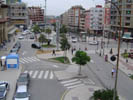Posted: July 7th, 2003 | No Comments »
Avant que je ne le perde sur la Shoutblog, voici le lien du Personal Marabouts Generator pointé par icon.
Posted: July 7th, 2003 | No Comments »
Mon ex-collocataire, mais toujours cousin et ami Mathieu tient un blog pendant son projet Le Chemin de l’équité en Amérique du Sud.
Posted: July 7th, 2003 | No Comments »


Posted: July 7th, 2003 | No Comments »
I stubbled on an article in the NY Times on addiction to information. Here are the parts I found most informative. So how much is too much!? And is multitasking counterproductive!? Based on this article, I must admit that it makes me consider taking more Internet-free weekends:
“It’s hard to concentrate on one thing,” he said, adding: “I think I have a condition.”
For all the efficiency gains that it seemingly provides, the constant stream of data can interrupt not just dinner and family time, but also meetings and creative time, and it can prove very tough to turn off.
Others may be sitting at a desk and engaging in conversation on two phones, one at each ear. At social events, or in the grandstand at their children’s soccer games, they read news feeds on mobile devices instead of chatting with actual human beings.
they are compulsively drawn to the constant stimulation provided by incoming data. Call it O.C.D. – online compulsive disorder.
Dr. Hallowell and John Ratey, an associate professor at Harvard and a psychiatrist with an expertise in attention deficit disorder, are among a growing number of physicians and sociologists who are assessing how technology affects attention span, creativity and focus. Though many people regard multitasking as a social annoyance, these two and others are asking whether it is counterproductive, and even addicting.
The pair have their own term for this condition: pseudo-attention deficit disorder. Its sufferers do not have actual A.D.D., but, influenced by technology and the pace of modern life, have developed shorter attention spans.
According to research compiled by David E. Meyer, a psychology professor at the University of Michigan, multitaskers actually hinder their productivity by trying to accomplish two things at once. Mr. Meyer has found that people who switch back and forth between two tasks, like exchanging e-mail and writing a report, may spend 50 percent more time on those tasks than if they work on them separately, completing one before starting the other.
Bucking the recent tradition at trade shows and technology conferences, the organizers decided not to provide wireless Internet access inside the conference.
The technology gives him a way to direct his excess energy. “It is a kind of Ritalin,” he said, referring to the drug commonly taken by people with attention deficit disorder.
Posted: July 4th, 2003 | No Comments »
Some sinks at the EPFL seem to have been downgraded to new-old-style warm-watter-less sinks (from my trip in Lausanne last week). Are our elite researchers back to pratical technology?

Posted: July 3rd, 2003 | 3 Comments »
Dans le cadre de mes cours d’espagnol à l‘Universidad de Oviedo (Asturias, Espana), je suis allé à une conférence donnée par le directeur du département de Filologia Espanola, José Antonio Martínez García. Même si mon niveau d’espagnol est rudimentaire j’ai tout de même pu comprendre certains points sur l’état de la langue espagnole dans le monde:
Read the rest of this entry »
